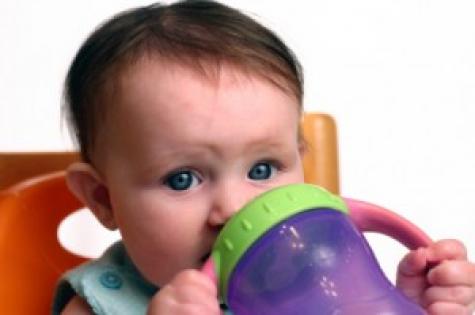Toddlers who continue to use bottles beyond 12-15 months of age tend to be overweight, but simply switching them to sippy cups may not prevent extra weight gain, according to a new study published in The Journal of Pediatrics.
Doctors recommend introducing sippy cups at six months and weaning toddlers off bottles completely by the time they're 15 months old.
But 20% of two-year-olds and 10% of three-year-olds in the study, by the Albert Einstein College of Medicine in New York, continue to use bottles, often drinking five bottles of whole milk every day, researchers said.
"Bottles can become a vessel for extra, or ‘stealth' calories, because they are often used indiscriminately. For example, while in a stroller, or to put a child to bed," said Dr Karen Bonuck.
"Before you know it, a child can take in 150 calories of whole milk in a bottle on top of their regular diet," Dr Bonuck said.
The researchers wanted to see if giving parents educational materials as part of a program called ‘Proud to Be Bottle Free' and a sippy cup would reduce the number of bottles kids used and the calories they consumed.
They enrolled 300 pairs of parents and 12-month-olds, with the participants randomly split into two groups: a bottle-weaning group that received the materials and sippy cup and a comparison group that did not.
The research team checked in with parents over the next year to find out how many bottles kids were consuming every day, as well as what else they ate and drank.
After three months, bottle usage had dropped from 4.6 bottles per day to two bottles per day among kids in the bottle-weaning program. There was a smaller drop in the comparison group, from 4.4 bottles per day to 2.7, on average.
Sippy cup usage increased more in the bottle-weaning group.
By one year, toddlers in both groups were averaging about one bottle per day.
Kids in the bottle-weaning program consumed slightly fewer calories - 1,090 calories per day, on average, versus 1,186 among comparison children. But the difference was small enough that it could have been due to chance.
"At first we were surprised that there was no effect upon overweight status," Dr Bonuck said, "but looking at the data more closely, this seems partially attributable to the substitution of sippy cups for bottles in the intervention group."
She said the advice to wean toddlers off bottles by 15 months should be extended to sippy cups.
"They seem to just substitute for bottles well into the second and third years of life. In addition, we need to develop guidelines for liquid intake - including the proper balance of liquid versus solids during the second year of life," she said.
"Around 12 months, a child should be getting much of his/her nutrition through food," Angela Lemond told Reuters.
A dietitian and spokesperson for the Academy of Nutrition and Dietetics, she was not involved in the new research.
Ms Lemond said breast milk, toddler formulas, whole milk and 120-175ml of 100% juice each day are all good choices for toddlers.
Beverages not on the recommended list for toddlers include low-fat milk or sweetened flavoured milks like chocolate or strawberry, sport drinks, soda and other caffeinated beverages.
The World Health Organisation recommends exclusive breastfeeding - without any formula, other milk or solid food - until a baby is six months old, followed by breastfeeding with the addition of appropriate foods through age two.



















__small.png)










